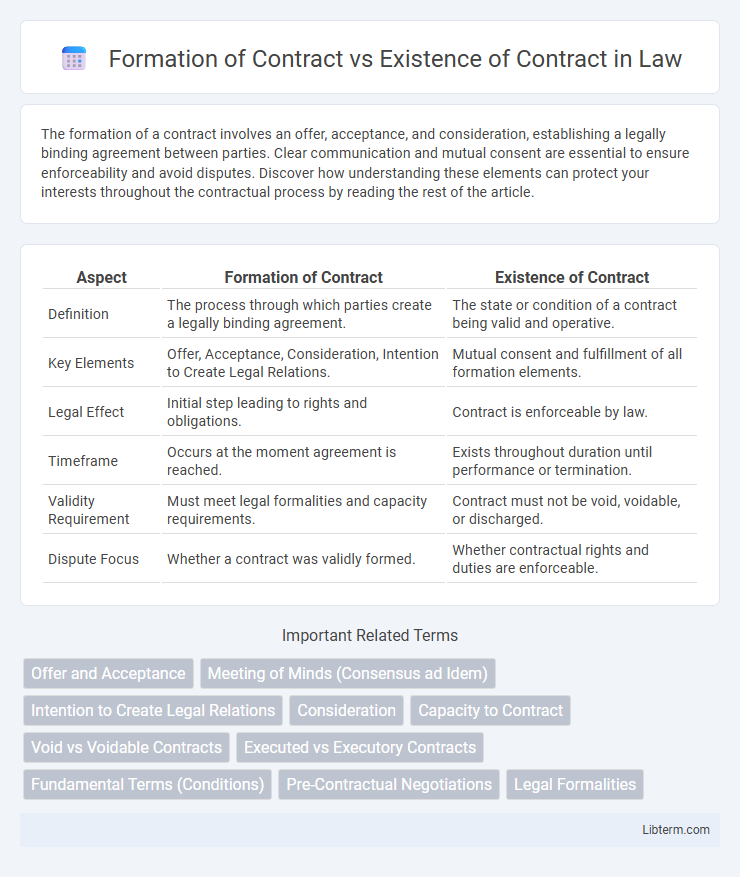The formation of a contract involves an offer, acceptance, and consideration, establishing a legally binding agreement between parties. Clear communication and mutual consent are essential to ensure enforceability and avoid disputes. Discover how understanding these elements can protect your interests throughout the contractual process by reading the rest of the article.
Table of Comparison
| Aspect | Formation of Contract | Existence of Contract |
|---|---|---|
| Definition | The process through which parties create a legally binding agreement. | The state or condition of a contract being valid and operative. |
| Key Elements | Offer, Acceptance, Consideration, Intention to Create Legal Relations. | Mutual consent and fulfillment of all formation elements. |
| Legal Effect | Initial step leading to rights and obligations. | Contract is enforceable by law. |
| Timeframe | Occurs at the moment agreement is reached. | Exists throughout duration until performance or termination. |
| Validity Requirement | Must meet legal formalities and capacity requirements. | Contract must not be void, voidable, or discharged. |
| Dispute Focus | Whether a contract was validly formed. | Whether contractual rights and duties are enforceable. |
Introduction to Contract Law
The formation of a contract involves the essential steps and elements such as offer, acceptance, consideration, and intention to create legal relations that lead to a valid agreement. Existence of a contract refers to the presence of these elements resulting in a legally binding agreement enforceable by law. Understanding the distinction is crucial in contract law to determine when parties become legally obligated.
Defining Contract Formation
Contract formation refers to the precise process by which an agreement between two or more parties becomes legally binding, involving essential elements such as offer, acceptance, consideration, and mutual intent to create legal relations. This phase establishes the foundational framework for the contract, distinguishing it from the mere existence of a contract, which denotes that all formation criteria have been successfully met and the contract is enforceable. An effective contract formation ensures clarity in obligations and rights, preventing disputes and providing legal recourse in case of breach.
Understanding Contract Existence
Understanding contract existence centers on the mutual agreement between parties, characterized by offer, acceptance, and consideration, which collectively establish the contract's validity. Formation of a contract encompasses these elements alongside legal capacity and lawful purpose, ensuring the contract is enforceable under contract law. The existence of a contract is confirmed when all essential components align, legally binding the parties to their obligations.
Key Elements of Contract Formation
Contract formation requires an offer, acceptance, consideration, and mutual intent to create legal relations, ensuring a legally binding agreement between parties. The existence of a contract depends on the presence of these key elements along with capacity and legality of purpose, which validate the agreement's enforceability. Without clear offer, acceptance, consideration, and legal intent, no contract legally exists despite preliminary negotiations or agreements.
Criteria for Contract Existence
A contract exists only when essential criteria such as offer, acceptance, consideration, and mutual intent to create legal relations are met. The formation of a contract involves the negotiation phase leading up to meeting these criteria, whereas the existence of a contract is confirmed once these elements are legally established. Without clear agreement on these components, no enforceable contract can be said to exist.
Offer and Acceptance: Foundation of Formation
Offer and acceptance constitute the fundamental elements in the formation of a contract, as they establish mutual consent necessary for a legally binding agreement. The formation of a contract is completed when an offer made by one party is unequivocally accepted by the other, creating an enforceable obligation. The existence of a contract depends on the presence of a valid offer and an unequivocal acceptance, ensuring that both parties have a clear understanding and intention to be bound by the contract terms.
Intention to Create Legal Relations
The formation of a contract requires a clear intention to create legal relations, which distinguishes it from mere agreements or social arrangements. Courts often assess the parties' conduct and context to determine if this intention exists, ensuring that only serious commitments are enforceable. Without this intention, an agreement may lack the legal validity needed to establish an enforceable contract under contract law principles.
Consideration and Its Role
Consideration is fundamental in the formation of a contract, serving as the value exchanged between parties to validate their agreement. The existence of a contract hinges on this mutual exchange of consideration, distinguishing a legally binding agreement from a mere promise. Without consideration, courts typically do not recognize the contract's enforceability, emphasizing its critical role in contract law.
Distinguishing Formation from Existence
The formation of a contract refers to the process by which parties reach an agreement, involving offer, acceptance, consideration, and intention to create legal relations. In contrast, the existence of a contract hinges on whether a legally binding agreement has actually been established, evidenced by the fulfillment of essential contract elements. Understanding this distinction clarifies that formation addresses the procedural steps, while existence confirms the contract's validity and enforceability under law.
Legal Implications of Formation vs Existence
The formation of a contract involves the process of offer, acceptance, consideration, and mutual intent, establishing the legal basis upon which obligations arise. The existence of a contract confirms that these essential elements are present, ensuring enforceability under contract law and providing parties with defined rights and remedies. Legal implications differ as formation addresses the act of creating binding agreements, while existence validates their current legal status and execution.
Formation of Contract Infographic

 libterm.com
libterm.com